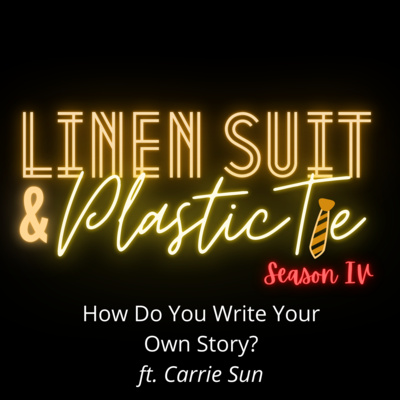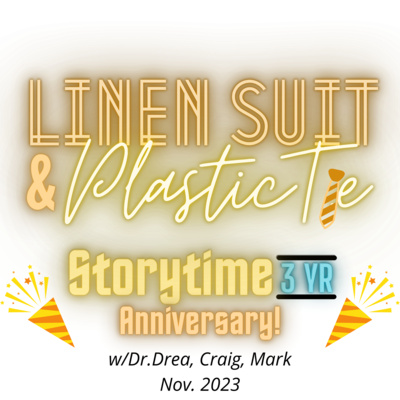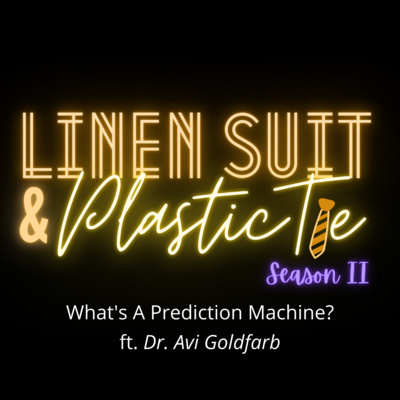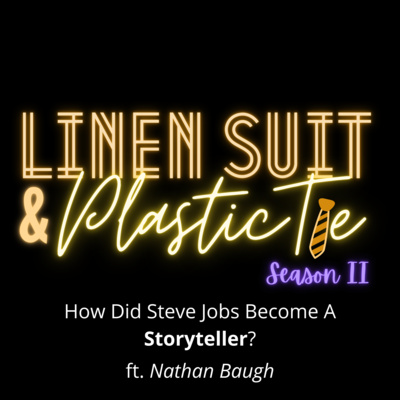
Linen Suit & Plastic Tie
By Gorav Menon & Kevin Liu


Why Connection Beats Perfection? ft. a Stanford MBA Professor (Matt Abrahams)
Why does saying the wrong thing make you a better communicator? How do we manage stress in any form of talking? How does martial arts make you better at communicating? How do you communicate with a Gen Z audience?
This week, we talk to Matt Abrahams, a lecturer at Stanford University’s Graduate School of Business (Stanford GSB), where he teaches popular classes in strategic communication and effective virtual presenting. Matt hosts the award-winning Think Fast, Talk Smart podcast, and is the author of Think Faster, Talk Smarter: How to Speak Successfully When You’re Put on the Spot.

What Wishes Do Games Fulfill? ft. Executive Producer @ Marvel Games (Eric Monacelli)
What does Gorav think about his first video game in years? How can arts, pre-med, music, and writing backgrounds set you up for a video game career? What do Spider-Man, MLB 2K, and Call of Duty have in common? This week, we learn from the captivating story of Eric Monacelli, Executive Producer at Marvel Games. Before that, Eric has had a decorated career experience across video game studios such as Naughty Dog, 2K Games, Capcom, Infinity Ward, and Atari. He is also a published author in Primary Psychiatry.

How Will AI Shape Our Stories? ft. a Pulitzer Prize Finalist (Vauhini Vara)
What storytelling lens do gen AIs have, and how does ChatGPT think about a book that talks about it? What does ChatGPT itself recommend this episode to you? This week, we chat with Vauhini Vara, author of the genre-bending non-fiction Searches: Selfhood in the Digital Age.
Vauhini started her career in tech journalism at Wall Street Journal and later contributed to various well-known news platforms. In her subsequent creative writing career, she wrote The Immortal King Rao and This is Salvaged. Gorav discovered Vauhini's work because ChatGPT recommended it to him.

What Brings a Brand LIFE? ft. a VP of Creative @ Liquid Death (Andy Pearson)
Finally, we're talking about Liquid Death, one of Gorav's favorite brands. How do you bring life into a brand? What makes canned water work? How does being healthy & sustainable become cool? This week, we chat with Andy Pearson, VP of Creative at Liquid Death.
After 12+ years as a copywriter and creative director at ad agencies, Andy now creates and leads creative with an incredible team at Liquid Death on its evil mission to make the world healthier and more sustainable.

What Should We TALK About? ft. a Harvard Business School Professor (Alison Wood Brooks)
Why and how should you prepare Topics for every conversation? When are you Asking the right questions? How do you bring Levity? Why does Kindness come from storytelling?
Welcome back to your storytelling journey! To kick off Season Five, we're having a great talk with the author of TALK: The Science of Conversation and the Art of Being Ourselves , Alison Wood Brooks. At Harvard Business School, Alison teaches an award-winning course in the MBA curriculum called “TALK.”

What Makes Animation So Magical? ft. a Psychologist (Dr. Drea Letamendi)
What are some of our favorite lessons from this season? What is the unique storytelling power of animation? For our season finale, we welcome back our dear friend Dr. Drea Letamendi. Drea is a clinical psychologist at UCLA, a psychological consultant for film, TV, graphic novels, and books, and a unique storyteller who draws important connections between pop culture and the story we tell ourselves.

Why Do We Love Bookstores? ft. a NYTimes Bestseller (Evan Friss)
Why do you love being in bookstores? What is the story of bookstores in American history? How did Barnes & Noble switch onto the underdog's team in the bookselling industry? What are the common traits of booksellers? This week, we chat with Evan Friss, author of New York Times Bestseller The Bookshop: A History of the American Bookstore, and Professor of Urban and Public History at James Madison University.

How Can Stories Shape the Future of Education? ft. a Stanford Education Innovator (Isabelle Hau)
What is the dangerous story about technology in education, and where does the opportunity really lie? How should we revamp our reigning education system's core story and design for the past 200 years? What is Relational Intelligence, and why should we develop it in children? We chatted with Isabelle Hau, the executive director of Stanford Accelerator for Learning, about her own childhood education story and her insights into education tech. Isabelle has dedicated her career to innovating and investing in early childhood education, leveraging the latest science, data, and technology for two decades.

Storytime w/Gorav & Kevin - LSPTPod 4-Year Anniversary Special
Has four years of exploring the power of storytelling ruined anything for ourselves? How have the lessons from our expert storytellers seeped into our day-to-day lives? What are our stories this year? Here's a special recap for LSPTPod's 4th anniversary. Thank you for joining, and we hope you're learning as much as we are.

How To Build Your Own Sonic World? - Storytime ft. a Sound Aficionado (Dallas Taylor)
How do the sounds we hear affect the story we tell ourselves? Why and how should you curate the sounds in your life? Is silence a sound? In a conversation that felt much too short, we chat with Dallas Taylor - sound aficionado, host and creator of the amazing Twenty Thousand Hertz podcast, and Creative Director of Defacto Sound.

Can Video Games Be Educational? ft. a Religious Theory Professor (ProfNoctis)
ProfNoctis' dissertation was on Judeo-Christian Kingship through Final Fantasy XV, a video game.

How Are Venture and Broadway Investing Alike? ft. a Harvard Business School Professor (Christina Wallace)
Christina Wallace has crafted a career at the intersection of business, technology, and the arts. She is currently a Senior Lecturer at Harvard Business School, where she teaches entrepreneurship and leads HBS Startup Bootcamp. She is author of The Portfolio Life, and a co-producer to multiple Tony-nominated musicals.

What is A Human Venn Diagram? ft. a Harvard Business School Professor (Christina Wallace)
Christina Wallace has crafted a career at the intersection of business, technology, and the arts. She is currently a Senior Lecturer at Harvard Business School, where she teaches entrepreneurship and leads HBS Startup Bootcamp. She is author of The Portfolio Life, and a co-producer to multiple Tony-nominated musicals.

How Do You Write Your Own Story? ft. a Memoir Author (Carrie Sun)
Carrie Sun was born in China and raised in Michigan. She holds an MFA in creative writing from The New School. She graduated early from MIT, worked as a quant, dropped out of MBA, worked in one of the most prestigious hedge funds in the world, and left to become a writer.

Can Gaming Transform the Paper of Record? ft. a Head of Games @ the New York Times (Jonathan Knight)
Before joining the New York Times, Jonathan worked on some of the best-known IPs and game franchises, including Quake, Wolfenstein, The Sims, Harry Potter, and The Simpsons.

What Are The Stories Behind Our Decisions? ft. a Behavioral Scientist (Nuala Walsh)
When making life decisions big and small, are you choosing the best option on paper, or the best option for YOU? How can storytelling trick people in their decision making, and how do we see through the trickery? To kick off Season Four, we chat with Nuala Walsh, a behavorial scientist, one of 100 Most Influential Women in Finance, and former Marketing executive at some of the best-known investment banking firms.
In her new book Tune in: How to make smarter decisions in a noisy world, Nuala delves into the common traps when we make decisions, and how we can navigate them.

Season Four Trailer

How Do You Love Your Mind? ft. a Chief Content Officer @ Headspace (Morgan Selzer)

How Did a TV Movie Save the World? ft. a Communications Professor (David Craig, Apocalypse Television)
How did a TV film save the world from nuclear destruction? What do we miss out on if we dismiss social media? Why do we have so many dystopian sci-fi stories but few in the opposite light? This week, we talk to David Craig, Clinical Professor of Communication at USC Annenberg School for Communication and Journalism.
An expert on Hollywood and social media entertainment, David's new book Apocalypse Television accounts an important period in TV and world history around The Day After: a film that contributed to what historians describe as "Reagan’s Reversal” in the 1980s, which led to the end of the Atomic Arms Race. As Disney CEO Bob Iger wrote in the book's foreword, "those who tell the stories may save the world."

Storytime - LSPTPod 3rd Year Anniversary Special (w/ Dr. Drea Letamendi, Craig Thompson, Mark Chavez)

Can AI Help Write A Novel? ft. an AI-Experimenting Novelist (Stephen Marche)
At this point, you've probably heard so much about ChatGPT and language model AI, but can it actually help write a book? How is an AI-written novel really created? Amid all the craze and myths of the recent "AI boom", we chat with Stephen Marche, a novelist who was tasked to create an "AI-generated novel," Death of an Author, (with Pushkin) to really understand the capabilities and limits of language model AI / linguistic AI, and how we should treat this tool.
Stephen Marche is a novelist and essayist. He has written features and essays for The New Yorker, The New York Times, The Atlantic, and many others. He has collaborated with artificial intelligence on the first AI-generated novel reviewed in The New York Times, Death of an Author.

What is Your Golden Moment? ft. a fmr Director @ MasterClass (Davis Carter)

Where Are Your Roots? ft. a Non-Fiction Graphic Novelist (Craig Thompson)
Why is the American agriculture story relevant to you (yes, you)? Is comic book a genre or a medium? Why should you care about where your food comes from? How does the story of an herbal root connect the United States and China?
This week, we chat with graphic novelist Craig Thompson about his latest autobiographical comic book series Ginseng Roots. Kevin stumbled upon an issue in the series and got super curious - what could an American artist possibly say about Northeastern China and an herbal root best known in Chinese medicine? He ended up loving the entire series. Ginseng Roots explores class divide, agriculture, holistic healing, the 300-year-long trade relationship between China and North America, childhood labor, and the bond between two brothers.
Craig Thompson is a cartoonist and the author of the award-winning books Blankets; Good-bye, Chunky Rice; and Habibi. He grew up in a rural farming community in Marathon, Wisconsin, world capital of ginseng.

What Is Cable's Legacy (Part II)? ft. a fmr. Cable TV Executive (Doug Herzog)
How do a channel's advertisement and content creation fuel each other to strengthen its story? How does the late night / day time / prime time distinction affect content styles on cable? What is cable TV's legacy to entertainment and storytelling? This week, we finish up our conversation with Doug Herzog, delving into more questions we have about cable as a storytelling medium. Following his illustrious career as President of Viacom (MTV and Comedy Central), Doug now co-host the Basic! podcast, where he documents the history of basic cable TV and its impact on American lives.

What Story Does Cable Tell (Part I)? ft. a fmr. Cable TV Executive (Doug Herzog)
What are the stories of MTV and Comedy Central? How has The Daily Show changed through different eras (Craig Kilborn, Jon Stewart, Trevor Noah)? What will become of late night TV? This week, we welcome to our show Doug Herzog, former President of Viacom. Following his illustrious career of bringing MTV and Comedy Central to their respective primes, Doug now co-host the Basic! podcast, where he documents the history of basic cable TV and its impact on American lives.

How Do ASL and Comedy Make a Physician? ft. a Medical Doctor (Dr. G)

How Do You Auction A Story? ft. a Christie's Auctioneer (Lydia Fenet)
Lydia is author of The Most Powerful Woman in the Room is You and Claim Your Confidence: Unlock Your Superpower and Create the Life You Want. She also hosts the Claim Your Confidence podcast.

"Am I Cool?" - LSPTPod 50th Episode Special w/Benji & Sophia
---
The following music was used for this media project:
Music: Hyperfun by Kevin MacLeod
Free download: filmmusic.io/song/3891-hyperfun
License (CC BY 4.0): filmmusic.io/standard-license

How Do You Make Muppets in Moscow? ft. a Sesame Street "Ulitsa Sezam" Producer (Natasha Lance Rogoff)
Natasha Lance Rogoff is an is an award-winning filmmaker, journalist and the TV producer/director who, with her team, brought Sesame Street to Russia after the collapse of the Soviet Union.

How Do You Make a Sci-Fi & a Rom-Com? ft. a Comedian (Mark Chavez)

"I Know These Chickens" - Storytime w/Dr. Sahar Yousef
Visit https://shop.becomingsuperhuman.science/ and use code: “LSPT” for 10% off physical products. All proceeds go to supporting ongoing scientific research. Note: we are NOT sponsored in anyway (nor are we receiving any monetary benefits) by the becoming superhuman lab, we are just fans!
Featured in Forbes, Business Insider, and the Headspace App, Dr. Sahar Yousef is a cognitive neuroscientist, a lecturer at UC Berkeley Haas School of Business, and founder of Becoming Superhuman. Her 10-plus years of research on “making superhumans” sheds light on how to improve focus, memory, and overall human performance.

What Makes A Good Friendship Story? ft. a Novelist-Advika & The Hollywood Wives (Kirthana Ramisetti)

Why Do Humans Love Games? ft. a a16z Gaming Investor (Joshua Lu)

What Stories Are Your Brands Telling? ft. a Neuromarketing Professor (Dr. Matt Johnson)
How does storytelling affect the essence of products and brands? What does neuroscience have to do with Marketing? This week, we chat with Dr. Matt Johnson, a marketing professor, a neuroscientist, and author of Branding that Means Business: Building Enduring Bonds between Brands, Consumers & Markets. With a PhD in Cognitive Psychology and Neuroscience from Princeton University, Matt's journey is full of interesting intersections: academia x corporate, the U.S. x China, and psychology x neuroscience x marketing.

What Can Villainy Teach Us About Empathy? ft. a Superhero Psychologist (Dr. Drea Letamendi)

Rewind - Why Is Music NOT a Universal Language (cont'd)? ft. a Musician (Greg Pliska)

Rewind - Why are Botox Sales Going Up? ft. a Cognitive Neuroscientist (Dr. Sahar Yousef)
In the spirit of holiday season, we'd like to take you on a rewind and listen back to our conversation with Dr. Sahar Yousef back in Season One, an important conversation about our stress and internal storytelling. We hope it will help us all understand and cope with our stress and internal voices better.
---
We ALL have racing thoughts and narratives about ourselves that we can't shut down - our "identity-based beliefs". How do we use that to our advantage? What is "stress" physiologically speaking? Is "video fatigue" real, and why are Botox sales through the roof since COVID? This week, we unpack it all with Dr. Sahar Yousef. Dr. Sahar Yousef is a cognitive neuroscientist as well as faculty at UC Berkeley’s Haas School of Business. She has conducted research on brain plasticity, human performance enhancement, and cognitive training. Outside of the academic world, Sahar runs “Becoming Superhuman”, a training and consulting firm which teaches busy professionals who think for a living how to get their most important work done, in less time, with less stress. Her work has been featured in Forbes, The Wall Street Journal, Wired, and Business Insider.

What's A Prediction Machine? ft. an AI Professor (Dr. Avi Goldfarb)
What does "AI" really look like in businesses today? What is a Prediction Machine, and what is AI Economics? This week, we chat with Dr. Avi Goldfarb, author of Prediction Machines and Power and Prediction: The Disruptive Economics of Artificial Intelligence. Through a sequence of fascinating stories, Avi helps us demystify the stigma around artificial intelligence, and he helps us understand how AI has transformed and can transform business and industry the way electricity transformed steam-powered factories. Avi is the Rotman Chair in Artificial Intelligence and Healthcare and a professor of marketing at the Rotman School of Management, University of Toronto, Chief Data Scientist at the Creative Destruction Lab and the CDL Rapid Screening Consortium.

Storytime w/Gorav & Kevin - LSPTPod 2-Year Anniversary Special
What have happened to Gorav and Kevin in the past year? What was the original idea Gorav and Kevin had about starting a podcast? How would we describe each of our guests in one word? What changes have we made in Season Two, and what's coming in Season Three? As we celebrate LSPTPod's 2-Year anniversary, we sit down, look back, look around, then look forward to this journey we've been on with you, and we're so thankful for it.

*BONUS* Does Experience Affect Taste? ft. a Wine Journalist (Erin Kirschenmann)
We dive deep into more of your random wine questions!
Do you really need a decanter for wine? What are you supposed to do when you order a bottle of wine at a restaurant, and your server pours out a sip for you to taste it? Why do some wine labels never tell you what's in the bottle? For this bonus episode with wine journalist Erin Kirschenmann, we find answers to some of our (and probably your) biggest questions about wine drinking.

Does Experience Affect Taste? ft. a Wine Journalist (Erin Kirschenmann)

Why Do We Love Things? ft. a Love Professor (Dr. Aaron Ahuvia)
Let's tackle the big question: what is love? Better yet, how do the things we love affect our stories and identities? Why do we love something, and what do we actually love about it? This week, we chat with Dr. Aaron Ahuvia, the world's leading academic expert on non-interpersonal love. Dr. Ahuvia is Professor of Marketing at the University of Michigan-Dearborn College of Business, who has pioneered the research on love since 1990. He shares with us what it means to love, how the things we love add to our stories and identities, and how products and brands can foster brand love among customers.

How Can Storytelling Buy You More Happiness (Part II)? ft. a Time Professor (Dr. Cassie Holmes)
How can we create happier memories for ourselves with the power of storytelling? How do we make sure to savor moments of joy and not take them for granted? How many things can we get done within your limited hours in a day, and how many more things could we get done if we learn the happiest way to manage our time? We continue our conversation with Dr. Cassie Holmes, award-winning Professor at UCLA’s Anderson School of Management, researcher of time and happiness, and author of Happier Hour: How to Beat Distraction, Expand Your Time, and Focus on What Matters Most.

How Can Storytelling Buy You More Time (Part I)? ft. a Happiness Professor (Dr. Cassie Holmes)
What makes us happy, and what will make us happier? How can the story we tell ourselves about time affect our happiness level? In a world that easily makes us feel "time poor", how do we make the most of our limited time? This week, we chat with Dr. Cassie Holmes, award-winning Professor at UCLA’s Anderson School of Management, researcher of time and happiness, and author of Happier Hour: How to Beat Distraction, Expand Your Time, and Focus on What Matters Most.

How Did Steve Jobs Become A Storyteller? ft. a Storytelling Influencer (Nathan Baugh)
How did Steve Jobs transform Apple with storytelling, and how did he become a master storyteller? How does Twitter work as a storytelling platform, and how has storytelling turned Formula 1 into the fastest-growing sport in the U.S.? This week, we talk to Nathan Baugh, a storytelling influencer. From Batman to sports, Nathan chats with us about how storytelling transforms businesses and ideas, obvious or not. He shares with us one of the simplest actionable step we can all take to sharpen our storytelling minds, and why it's easier than we'd think.

Storytime w/Sophia - A Tale of Sneakers, Logos, and Suits

What Stories Does "Crypto" Tell? ft. an Angel Investor (Stephen Cole)
What does storytelling have to do with Bitcoin and cryptocurrencies, and what risks and opportunities do these stories create? While we do not explore investments or financial advice on this podcast, we are surely interested in understanding the storytelling involved in such assets. This week, we talk to Stephen Cole, an angel investor in Bitcoin. Stephen shares with us the role of storytelling plays in popularizing a technology, separating the story of a technology leader from the technology itself (i.e. "Bitcoin" vs. "crypto"), and what "money" has meant to societies across different ages.

Seriously, Why So Serious? ft. a Batman Exec Producer (Michael Uslan)
Yes, you know who Batman is, but did you know how Batman's (and Joker's) stories became the dark, serious cultural icons today? We kick off the second half of Season Two with the Executive Producer of EVERY Batman/Joker movie you've ever heard of. Michael Uslan spent 10 years of his life to convince Hollywood to produce the Batman that we know and love--from Batman (1989), The Dark Knight trilogy, to Joker (2019) and The Batman (2022), Michael reveals to us Batman's legacy on film-making and our culture throughout the decades.

Am I On Mute? ft. a Storytelling Coach (Mark Dannenberg)
